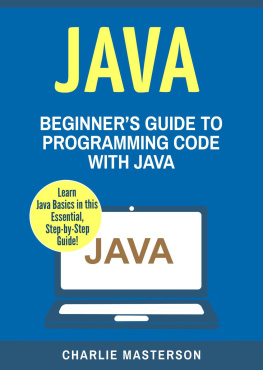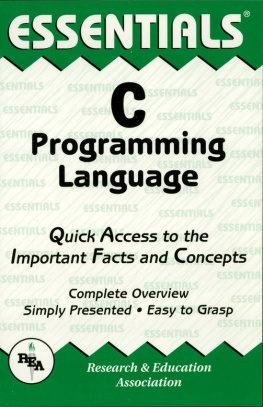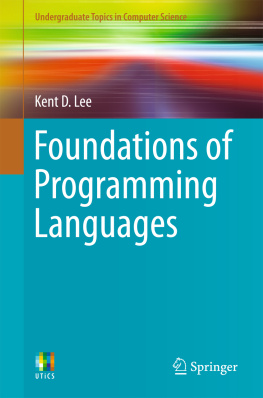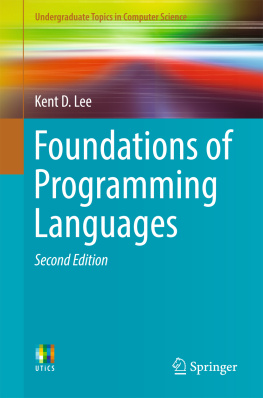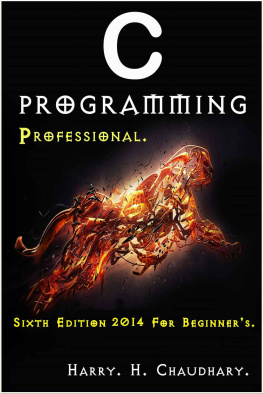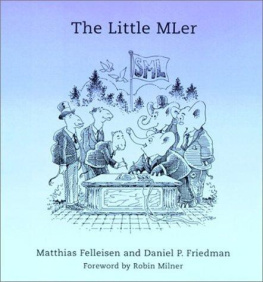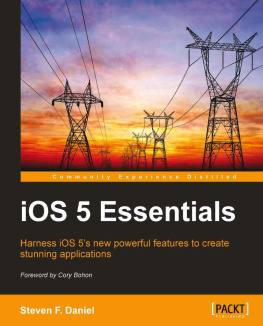Daniel P. Friedman - Essentials of Programming Languages, third edition
Here you can read online Daniel P. Friedman - Essentials of Programming Languages, third edition full text of the book (entire story) in english for free. Download pdf and epub, get meaning, cover and reviews about this ebook. publisher: The MIT Press, genre: Home and family. Description of the work, (preface) as well as reviews are available. Best literature library LitArk.com created for fans of good reading and offers a wide selection of genres:
Romance novel
Science fiction
Adventure
Detective
Science
History
Home and family
Prose
Art
Politics
Computer
Non-fiction
Religion
Business
Children
Humor
Choose a favorite category and find really read worthwhile books. Enjoy immersion in the world of imagination, feel the emotions of the characters or learn something new for yourself, make an fascinating discovery.

- Book:Essentials of Programming Languages, third edition
- Author:
- Publisher:The MIT Press
- Genre:
- Rating:5 / 5
- Favourites:Add to favourites
- Your mark:
- 100
- 1
- 2
- 3
- 4
- 5
Essentials of Programming Languages, third edition: summary, description and annotation
We offer to read an annotation, description, summary or preface (depends on what the author of the book "Essentials of Programming Languages, third edition" wrote himself). If you haven't found the necessary information about the book — write in the comments, we will try to find it.
Essentials of Programming Languages, third edition — read online for free the complete book (whole text) full work
Below is the text of the book, divided by pages. System saving the place of the last page read, allows you to conveniently read the book "Essentials of Programming Languages, third edition" online for free, without having to search again every time where you left off. Put a bookmark, and you can go to the page where you finished reading at any time.
Font size:
Interval:
Bookmark:
Essentials of
Programming
Languages
third edition
2008 Daniel P. Friedman and Mitchell Wand
All rights reserved. No part of this book may be reproduced in any form by any electronic or mechanical means (including photocopying, recording, or information storage and retrieval) without permission in writing from the publisher.
MIT Press books may be purchased at special quantity discounts for business or sales promotional use. For information, please email special_sales@mitpress.mit.edu or write to Special Sales Department, The MIT Press, 55 Hayward Street, Cambridge, MA 02142.
Library of Congress Cataloging-in-Publication Data
Friedman, Daniel P.
Essentials of programming languages / Daniel P. Friedman, Mitchell Wand.
3rd ed.
p. cm.
Includes bibliographical references and index.
ISBN 978-0-262-30409-2
1. Programming Languages (Electronic computers). I. Wand, Mitchell. II. Title.
QA76.7.F73 2008
| 005.1dc22 | 2007039723 |
d_r0
This book brings you face-to-face with the most fundamental idea in computer programming:
The interpreter for a computer language is just another program.
It sounds obvious, doesnt it? But the implications are profound. If you are a computational theorist, the interpreter idea recalls Gdels discovery of the limitations of formal logical systems, Turings concept of a universal computer, and von Neumanns basic notion of the stored-program machine. If you are a programmer, mastering the idea of an interpreter is a source of great power. It provokes a real shift in mindset, a basic change in the way you think about programming.
I did a lot of programming before I learned about interpreters, and I produced some substantial programs. One of them, for example, was a large data-entry and information-retrieval system written in PL/I. When I implemented my system, I viewed PL/I as a fixed collection of rules established by some unapproachable group of language designers. I saw my job as not to modify these rules, or even to understand them deeply, but rather to pick through the (very) large manual, selecting this or that feature to use. The notion that there was some underlying structure to the way the language was organized, and that I might want to override some of the language designers decisions, never occurred to me. I didnt know how to create embedded sublanguages to help organize my implementation, so the entire program seemed like a large, complex mosaic, where each piece had to be carefully shaped and fitted into place, rather than a cluster of languages, where the pieces could be flexibly combined. If you dont understand interpreters, you can still write programs; you can even be a competent programmer. But you cant be a master.
There are three reasons why as a programmer you should learn about interpreters.
First, you will need at some point to implement interpreters, perhaps not interpreters for full-blown general-purpose languages, but interpreters just the same. Almost every complex computer system with which people interact in flexible waysa computer drawing tool or an information-retrieval system, for exampleincludes some sort of interpreter that structures the interaction. These programs may include complex individual operationsshading a region on the display screen, or performing a database searchbut the interpreter is the glue that lets you combine individual operations into useful patterns. Can you use the result of one operation as the input to another operation? Can you name a sequence of operations? Is the name local or global? Can you parameterize a sequence of operations, and give names to its inputs? And so on. No matter how complex and polished the individual operations are, it is often the quality of the glue that most directly determines the power of the system. Its easy to find examples of programs with good individual operations, but lousy glue; looking back on it, I can see that my PL/I database program certainly had lousy glue.
Second, even programs that are not themselves interpreters have important interpreter-like pieces. Look inside a sophisticated computer-aided design system and youre likely to find a geometric recognition language, a graphics interpreter, a rule-based control interpreter, and an object-oriented language interpreter all working together. One of the most powerful ways to structure a complex program is as a collection of languages, each of which provides a different perspective, a different way of working with the program elements. Choosing the right kind of language for the right purpose, and understanding the implementation tradeoffs involved: thats what the study of interpreters is about.
The third reason for learning about interpreters is that programming techniques that explicitly involve the structure of language are becoming increasingly important. Todays concern with designing and manipulating class hierarchies in object-oriented systems is only one example of this trend. Perhaps this is an inevitable consequence of the fact that our programs are becoming increasingly complexthinking more explicitly about languages may be our best tool for dealing with this complexity. Consider again the basic idea: the interpreter itself is just a program. But that program is written in some language, whose interpreter is itself just a program written in some language whose interpreter is itself Perhaps the whole distinction between program and programming language is a misleading idea, and future programmers will see themselves not as writing programs in particular, but as creating new languages for each new application.
Friedman and Wand have done a landmark job, and their book will change the landscape of programming-language courses. They dont just tell you about interpreters; they show them to you. The core of the book is a tour de force sequence of interpreters starting with an abstract high-level language and progressively making linguistic features explicit until we reach a state machine. You can actually run this code, study and modify it, and change the way these interpreters handle scoping, parameter-passing, control structure, etc.
Having used interpreters to study the execution of languages, the authors show how the same ideas can be used to analyze programs without running them. In two new chapters, they show how to implement type checkers and inferencers, and how these features interact in modern object-oriented languages.
Part of the reason for the appeal of this approach is that the authors have chosen a good toolthe Scheme language, which combines the uniform syntax and data-abstraction capabilities of Lisp with the lexical scoping and block structure of Algol. But a powerful tool becomes most powerful in the hands of masters. The sample interpreters in this book are outstanding models. Indeed, since they are runnable models, Im sure that these interpreters and analyzers will find themselves at the cores of many programming systems over the coming years.
This is not an easy book. Mastery of interpreters does not come easily, and for good reason. The language designer is a further level removed from the end user than is the ordinary application programmer. In designing an application program, you think about the specific tasks to be performed, and consider what features to include. But in designing a language, you consider the various applications people might want to implement, and the ways in which they might implement them. Should your language have static or dynamic scope, or a mixture? Should it have inheritance? Should it pass parameters by reference or by value? Should continuations be explicit or implicit? It all depends on how you expect your language to be used, which kinds of programs should be easy to write, and which you can afford to make more difficult.
Next pageFont size:
Interval:
Bookmark:
Similar books «Essentials of Programming Languages, third edition»
Look at similar books to Essentials of Programming Languages, third edition. We have selected literature similar in name and meaning in the hope of providing readers with more options to find new, interesting, not yet read works.
Discussion, reviews of the book Essentials of Programming Languages, third edition and just readers' own opinions. Leave your comments, write what you think about the work, its meaning or the main characters. Specify what exactly you liked and what you didn't like, and why you think so.


